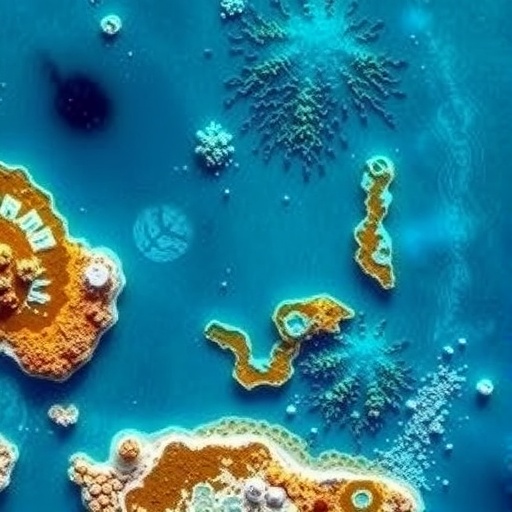Coral reefs, often referred to as the rainforests of the sea, are among the most vibrant ecosystems on the planet. They provide crucial habitats for a myriad of marine species, support livelihoods, and offer coastal protection. However, these underwater paradises are facing unprecedented threats due to climate change, overfishing, and pollution. The fourth global coral bleaching event has raised alarms across the scientific community, particularly for regions within the Southwestern Atlantic. Recent research led by Mies et al. sheds light on the devastating impacts of this event, revealing extensive coral bleaching and mortality across a 24° latitudinal range.
The ability of coral reefs to recover from such stressful conditions is largely influenced by their exposure to various ecological and environmental factors. This latest study highlights the critical importance of latitude in understanding the extent of bleaching. By examining a diverse range of locations along the Southwestern coast, the researchers have provided essential data that illustrates how different regions are responding to temperature anomalies and other stressors that accompany global warming. Their findings underscore the fragility of coral systems and the urgent need for targeted conservation efforts.
Across the 24° latitudinal expanse studied, significant instances of coral bleaching were observed. This phenomenon occurs when corals expel the symbiotic algae that provide them with their vibrant colors and 90% of their energy needs. The alarming rise in sea temperatures, a direct consequence of climate change, triggers this process, leading to a stark loss of biodiversity and a decrease in the overall health of coral ecosystems. The study revealed that the most affected areas were those that already faced additional pressures, such as nutrient runoff and sedimentation from nearby coastal development.
As coral reefs begin to bleach, they expose their underlying white calcium carbonate skeletons, thus leading to increased mortality rates among coral species. The research conducted by Mies and his colleagues demonstrated that certain coral species exhibited higher resilience to temperature changes, suggesting that some may adapt better to warmer conditions than others. However, the overarching trend illustrates that most communities are becoming increasingly vulnerable. This raises questions about the long-term survival of coral reefs and the potential for significant ecological shifts in these environments.
Importantly, the study also found that mortality rates among various coral species correlated strongly with the severity and duration of bleaching events. In regions where prolonged exposure to elevated temperatures was recorded, the consequences were particularly devastating, with some species experiencing up to a 70% loss in abundance. Mies and colleagues highlighted that the compounded effects of bleaching events further diminish the ability of coral populations to recover, resulting in altered community structures that can take generations to restore.
In addressing the data collected throughout their research, the authors emphasized the critical role that local factors play in influencing coral health and resilience. For instance, areas with poor water quality exhibited far worse outcomes compared to those with relatively cleaner environments. This suggests that as much as global climatic conditions set the stage for bleaching events, local stewardship and management practices can either exacerbate or mitigate their impacts. The findings are a clarion call for improved water governance and stricter environmental regulations in coastal zones.
Beyond coral health, the implications of these bleaching events extend to economic and social dimensions. Communities that rely on coral reefs for sustenance or tourism face dire challenges as these ecosystems decline. As fish populations diminish and attractive dive sites deteriorate, livelihoods are jeopardized, potentially impacting food security and local economies. This highlights the interconnectedness of human activity and marine ecosystem health, emphasizing the need for collaborative conservation initiatives that combine ecological science with socioeconomic considerations.
As the study continues to resonate within the scientific community, it paves the way for further research aimed at understanding the mechanisms behind coral resilience. By exploring genetic diversity, researchers hope to uncover the latent potential within coral populations that may allow them to withstand future ecological challenges posed by climate change. This area of inquiry could prove crucial in developing more effective conservation strategies aimed at bolstering resilience in coral reefs.
In conclusion, the research conducted by Mies et al. illuminates the alarming state of coral reefs in the Southwestern Atlantic during a pivotal time in the fight against climate change. The breadth of coral bleaching and resulting mortality throughout the studied latitudinal range serves as an urgent reminder of the fragility of these ecosystems and the need for immediate action. With each passing year, coral reefs inch closer to collapse unless decisive measures are taken to combat the underlying causes of stress, advocating for sustainable practices that protect these critical habitats for future generations.
To ensure the survival of coral reefs worldwide, we must collaboratively leverage the insights from this research to inform policy, encourage sustainable practices, and empower communities. The beauty and biodiversity of coral ecosystems are irreplaceable, and their decline would yield staggering ecological and socio-economic ramifications. As we confront the ongoing challenges posed by climate change, the imperative is clear: act now to protect and preserve the world’s coral reefs before it’s too late.
Subject of Research: Coral bleaching and mortality across a 24° latitudinal range in the Southwestern Atlantic during the fourth global bleaching event.
Article Title: Coral bleaching and mortality across a 24° latitudinal range in the Southwestern Atlantic during the fourth global bleaching event.
Article References:
Mies, M., Destri, G., Lacerda, C.H.F. et al. Coral bleaching and mortality across a 24° latitudinal range in the Southwestern Atlantic during the fourth global bleaching event. Coral Reefs (2025). https://doi.org/10.1007/s00338-025-02743-5
Image Credits: AI Generated
DOI: 10.1007/s00338-025-02743-5
Keywords: Coral reefs, climate change, bleaching, biodiversity, resilience, mortality, ecological impacts, conservation, environmental regulations.




